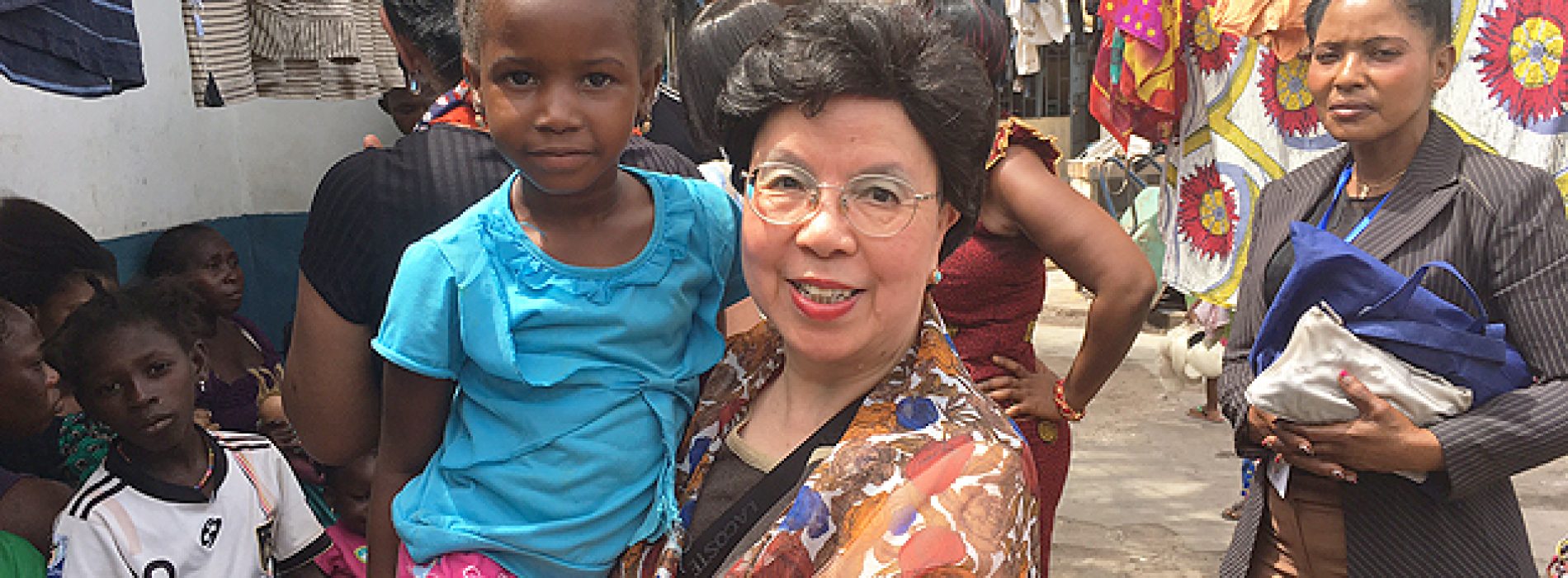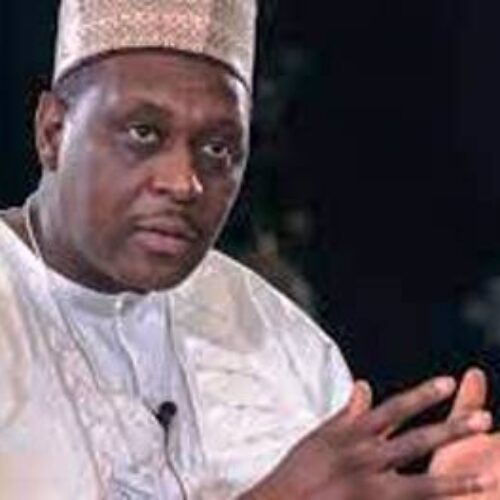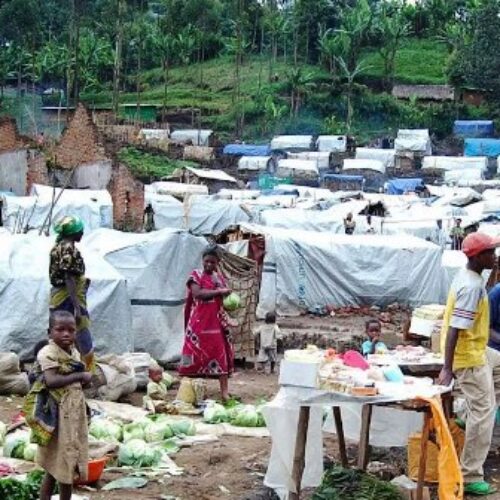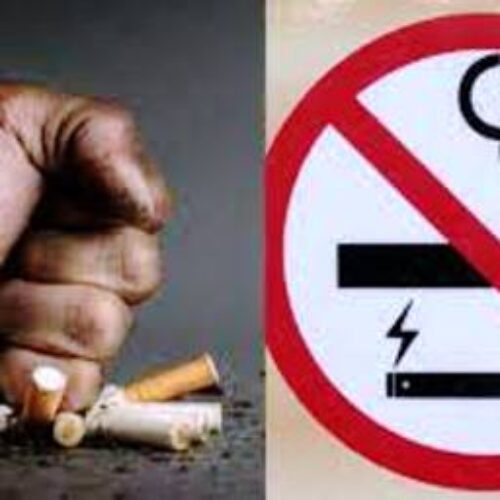Victory at last! The Ebola vaccine story
- WHO honours trial participants
More than 11 000 people in Guinea participated in a WHO-led trial to develop the world’s first vaccine against Ebola virus disease. The ground-breaking trial, which ended in January 2016, resulted in a vaccine that is highly protective against the deadly virus. Dr Margaret Chan, Director-General of WHO, visited some of the communities who participated in the vaccine trial in the city of Conakry. She thanked the people for their participation in this ground-breaking trial which has resulted in the world’s first effective vaccine against Ebola. She presented the communities with bags of rice to mark WHO’s appreciation. Read some of their stories here by WHO.
Sylla’s story
Aboubacar Sylla, 79 years old, lost 4 members of his family in the Ebola outbreak in West Africa in 2014-2015. His family was shunned by their own community when Ebola struck his family in the crowded commune of Dixinn Port, in the city of Conakry, Guinea. “Before the Ebola outbreak, everyone talked to one another here. Then suddenly we weren’t even allowed to leave our house,” he said. People stopped using the well in the open area in front of their home for fear of contamination and the children were forbidden to step out past the boundary of their front courtyard where they were used to play.
Sylla and his extended family of around 70 people took part in the Ebola vaccine trial in Guinea led by WHO. The trial lasted from March 2015 – January 2016, and resulted in the development of the first vaccine to provide substantial protection against Ebola.
Here, Mr Sylla holds his certificate of vaccination, sitting next to Dr Margaret Chan, WHO Director-General, who visited several families in Conakry who had participated in the vaccine trial. She thanked them for participating in the trial.
Everyone was involved

WHO/S. Hawkey
Sekou Minkailou, (centre) chief of Matam district in Conakry, worked closely with the team from WHO to convince his people to participate in the vaccine trial.
Sekou Minkailou, chief of Matam district in Conakry, worked closely with the WHO team to convince his people to participate in the Ebola vaccine trial. “We feel really happy, so relieved that this vaccine protects us,” he said.
In Matam district, 10 people, including a doctor, had already died during the Ebola outbreak and people were frightened of the new disease that they had never seen before in their country. “People were so scared, they refused to follow the advice from the government and health workers. They didn’t even want the Red Cross to be involved. They hid the bodies of people who died from Ebola because there was such horrible stigma attached to the family once it was touched by Ebola.”
Sekou and his colleagues in the district office were often the first people to have contact with families when a new Ebola case was announced.
Rapid treatment saved her life
Nana Sylla, 32 years old, has 2 daughters Mabinty [left], 11 years and Lucie [below], 7 years. In April 2015, she got infected with the Ebola virus and spent 2 weeks in Nonga Ebola treatment centre in Guinea. She doesn’t know how she got infected but says it wasn’t while she was working as a nurse.
Today she believes that rapid treatment saved her life. And she credits the vaccine trial as having protected her daughters, other close family members and neighbours from infection in the days following the onset of her disease. “We never knew who or when this disease would strike next. Everyone was afraid, so we really appreciate having this vaccine now,” she said.
Patient records and staff rosters were scribbled on whiteboards
At the peak of the Ebola outbreak in Guinea, so many people turned up at the Nongo Ebola treatment centre that it ran out of place, leaving people to die on the gravel outside.
Two years later, the former Ebola treatment centre appears abandoned. Large white tents flap in the hot air and an eerie silence emanates from the temporary buildings and corridors of plastic fencing that served as triage laneways to channel sick people as they arrived at the centre. Patient records and staff rosters scribbled on whiteboards mark a moment in time in this place where so many lives were lost. “One night, 28 people died here. I still have nightmares, I saw too many dead people,” said Dr Mohammed Keita, manager of the centre where he was in charge of 250 staff.
Keita tells how one night a pregnant woman came to the centre. She was already bleeding and very ill. It was too late to save her. She gave birth to a baby girl before she died. “That little baby was blessed by God,” he said, pointing to a photo of the child taped to the wall. “The baby tested positive for Ebola and we thought she would surely die as well. Then, a few days later, she tested negative for the disease. We all looked after her here, naming her Nubia after one of the health workers who worked at the centre.”
Since the Ebola outbreak ended, the treatment centre now cares for people with other infectious diseases including measles, yellow fever and other diseases with potential to cause epidemics.
Survivor adopts a child orphaned by Ebola
Binta sits in her tiny living room in the district of Coronthie, Conakry, clutching a pile of paper certificates protected by plastic. Each of these precious certificates bears the name of one her children: Djenab, Hassamata, Aboubacar and N’Famoussa. Every one of them had been infected with Ebola and survived. Fatoumata and her husband also got sick. Her husband, who got sick first, didn’t make it.
Fatoumata and her children were all identified early on in their illness and treated in the Donka Treatment Centre. On the day they were discharged from the Ebola treatment centre in Donka in April 2015, Fatoumata and her 4 young children received their “survivors’” certificates, signed by a doctor to verify that they were free from the disease and no longer contagious.
Two years later, Fatoumata says that beyond her close family, some people treat her as if she still has Ebola. “I used to sell food,” she said. “But people stopped buying from me.” Fatoumata Binta, pictured here with her other daughter who is also called Fatoumata. Fatoumata also adopted a child whose parents died of Ebola.
A worthwhile venture

WHO/S. Hawkey
Aboubacar Mafoudia Sylla. He still suffers stigma from having driven his Ebola-infected sister to the hospital. He was part of the vaccination “ring” around M’Mah.
Aboubacar Mafoudia Sylla (or Aboubacar Jr) took his sister M’Mah to a treatment centre in Nongo, Guinea, when she started showing symptoms of Ebola. Early treatment helped save her life.
“Everyone was so scared of Ebola but I couldn’t just abandon my sister. She would have died,” he said, telling how his decision to ride in the ambulance with her caused division within the family. Since then, even though he never got sick, Aboubacar Jr has suffered stigma from his contact with Ebola and has found it difficult to get regular work.
This all inspired Aboubacar Jr to take part in the Ebola vaccine trial. At first, he was reluctant to get involved. This was an experimental vaccine. What if it made his family sick? Did it contain the Ebola virus? Would it really protect his family against Ebola? But now the trial results have shown how worthwhile it was.
Courtesy: WHO
About author
You might also like
We’ll provide funds for 8,000 healthcare centres – Pate
The Federal Government says it will invest in 8,000 primary healthcare centres with the Basic Health Care Provision Fund (BHCPF). Prof. Muhammad Pate, Minister of Health and Social Welfare, made
FG takes campaigns against open defecation to Bakassi IDPs Camp
The Federal Government has taken up the campaign on the use of clean toilets to the Internally Displaced Persons, IDPs Camp in Bakassi, Bakassi Local Government Area of Cross River.
Grow food, not life threatening tobacco crops – WHO urges governments
The World Health Organisation (WHO), has urged governments to stop subsidizing tobacco farming and support more sustainable crops that could feed millions. In a message today to mark the World












0 Comments
No Comments Yet!
You can be first to comment this post!